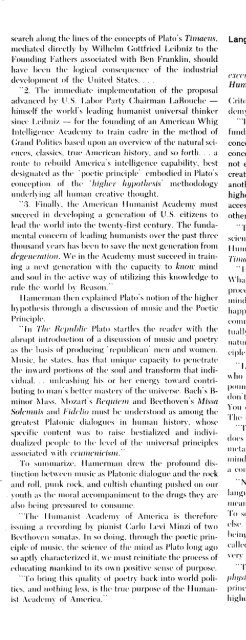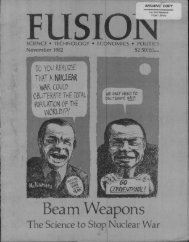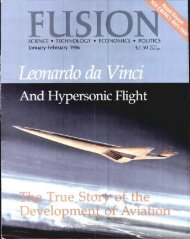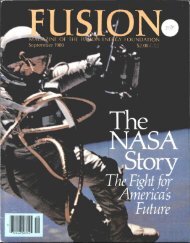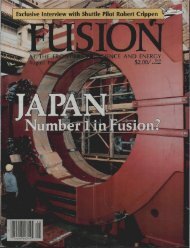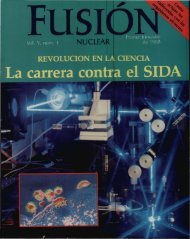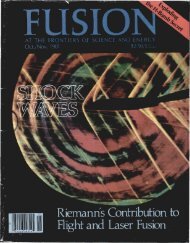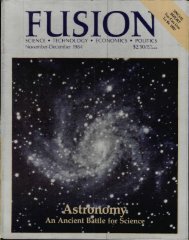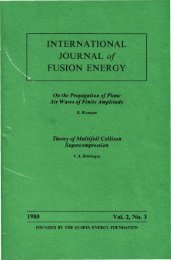You also want an ePaper? Increase the reach of your titles
YUMPU automatically turns print PDFs into web optimized ePapers that Google loves.
search along the lines of the concepts of Plato's Timaeus,<br />
mediated directly by Wilhelm Gottfried Leibniz to the<br />
Founding Fathers associated with Ben Franklin, should<br />
have been the logical consequence of the industrial<br />
development of the United States. . . .<br />
"2. <strong>The</strong> immediate implementation of the proposal<br />
advanced by U.S. Labor Party Chairman LaRouche —<br />
himself the world's leading humanist universal thinker<br />
since Leibniz — for the founding of an American Whig<br />
Intelligence Academy to train cadre in the method of<br />
Grand Politics based upon an overview of the natural sciences,<br />
classics, true American history, and so forth. . . a<br />
route to rebuild America's intelligence capability, best<br />
designated as the 'poetic principle' embodied in Plato's<br />
conception of the 'higher hypothesis' methodology<br />
Underlying all human creative thought.<br />
"3. Finally, the American Humanist Academy must<br />
succeed in developing a generation of U.S. citizens to<br />
lead the world into the twenty-first century. <strong>The</strong> fundamental<br />
concern of leading humanists over the past three<br />
thousand years has been to save the next generation from<br />
degeneration. We in the Academy must succeed in training<br />
a next generation with the capacity to know mind<br />
and soul in the active way of utilizing this knowledge to<br />
rule the world by Reason.<br />
Hamerman then explained Plato's notion of the higher<br />
hypothesis through a discussion of music and the Poetic<br />
Principle.<br />
"In <strong>The</strong> Republic Plato startles the reader with the<br />
abrupt introduction of a discussion of music and poetry<br />
as the basis of producing republican men and women.<br />
Music, he states, has that unique capacity to penetrate<br />
the inward portions of the soul and transform that individual.<br />
. . unleashing his or her energy toward contributing<br />
to man's better mastery of the universe. Bach's B-<br />
minor Mass, Mozart's Requiem and Beethoven's Missa<br />
Solenmis and Fidelia must be understood as among the<br />
greatest Platonic dialogues in human history, whose<br />
specific content was to raise bestialized and individualized<br />
people to the level of the universal principles<br />
associated with ecumenicism."<br />
To summarize, Hamerman drew the profound distinction<br />
between music as Platonic dialogue and the rock<br />
and roll, punk rock, and cultish chanting pushed on our<br />
youth as the moral accompaniment to the drugs they are<br />
also being pressured to consume.<br />
<strong>The</strong> Humanist Academy of America is therefore<br />
issuing a recording by pianist Carlo Levi Minzi of two<br />
Beethoven sonatas. In so doing, through the poetic principle<br />
of music, the science of the mind as Plato long ago<br />
so aptly characterized it, we must reinitiate the process of<br />
educating mankind to its own positive sense of purpose.<br />
"To bring this quality of poetry back into world polities,<br />
and nothing less, is the true purpose of the Humanist<br />
Academy of America.<br />
Language and Pedagogy<br />
excerpted from Criton Zoakos' presentation to the<br />
Humanist Academy<br />
Criton Zoakos expressed the central concern of the Academy<br />
by again discussing Plato's higher hypothesis.<br />
"<strong>The</strong> problem of a new idea, a scientific discovery, a<br />
fundamental concept is no longer the central point of<br />
concern. What is central is to know how another mind<br />
conceives this fundamental concept of the universe. It is<br />
not enough just to make a discovery. <strong>The</strong> task for the<br />
creative mind is to devise new pedagogies to bring<br />
another mind up to the level required to comprehend the<br />
higher hypotheses and, beyond mere understanding,<br />
access and stimulate that preconscious activity in that<br />
other mind.<br />
This is the fundamental, undiluted issue of natural<br />
science, and the founding concern of the American<br />
Humanist Academy, beginning with the Academy's<br />
Timaeus project.<br />
"How are thoughts communicated? How do you read?<br />
What you are reading is the footprint of the thought<br />
processes: the effort by that writer to replicate in the<br />
mind of the reader — to trigger in your mind — what<br />
happened in his mind, and to mediate that process by<br />
communicating in metaphorical language. You are actually<br />
studying what the great minds thought about<br />
nature. And the nature of language is the poetic principle.<br />
Language is not self-evident truth. Take a housewife<br />
who goes to the market and says, 'Gimme a quarterpound<br />
of salami.' This is not the use of language. You<br />
don't need language to get a quarter-pound of salami.<br />
You could just club the guy over the head and take it.<br />
<strong>The</strong> use of language is to trigger concepts.<br />
"<strong>The</strong>refore, language is necessarily metaphorical. It<br />
does not tell the absolute truth. Language is the use of<br />
metaphor to trigger the mental processes in another<br />
mind: to access the preconscious process which results in<br />
a conception you then name.<br />
"No scientific conception can be communicated unless<br />
language is metaphorical, poetic. What does 'west wind'<br />
mean to a human mind? To a sailor, it means one thing.<br />
To someone who has read Shelley it means something<br />
else. Plato's Timaeus suffers the usual denigration of<br />
being considered a 'myth invented by Plato, and socalled<br />
scholars will tell you, 'Oh, we don't take this thing<br />
very seriously.'<br />
"<strong>The</strong> Timaeus is a rigorous presentation of relativistic<br />
physics and any mind trained to understand the poetic<br />
principle of language as the means for communicating<br />
higher scientific concepts will read Timaeus in this way."<br />
55


